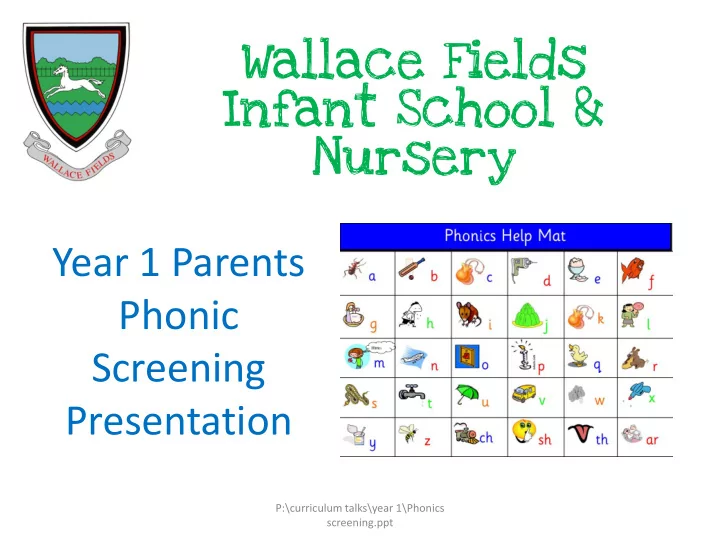

Wallace Fields Infant School & Nursery Year 1 Parents Phonic Screening Presentation P:\curriculum talks\year 1\Phonics screening.ppt
Phonics screening W/c 12th June Takes place during the week of 12 th -16t h June 2017 • The screening check will identify children who have phonic decoding skills below the • level expected for the end of year 1 and who therefore need addition support. The screening check ensures that teachers understand which children need support with decoding There are 40 words - 20 real and 20 nonsense ( some examples later in this • presentation) The screening is carried out individually with each child by the class teacher. It should • be an enjoyable activity for a child, which will take no more than 15 minutes. There will be a few practise words at the beginning to make sure your child understands the activity Results are reported to parents by letter and submitted to the Department for • Education in July If a child does not meet the threshold in year 1, support is put in place and they will • retake the screening at the end of year 2
How do WFIS results compare to other schools nationally? % of children % of children at WFIS who Year 1 Phonic Screening No of children nationally who achieve the expected Results at WFIS achieve the expected level level 2016 60 88 % (54 pupils) 80 %
Examples
l igh t light
p air pair
s n a k e snake
shog
foid
thade
think
brown
stripe
comic
pumpkin
fighters
reaching
What can you do to help your child at home? • There are a number of things that parents can do to support early reading development • Let your child see you enjoy reading yourself. They are influenced by you and what you do! • Immerse your child in a love of reading • Make time for your child to read their school book to you • With all books, encourage your child to ‘sound out’ unfamiliar words and then blend from left to right rather than just looking at pictures to guess • Encourage your child to ‘sound out’ when writing, blending from blend from left to right. Focusing particularly on spotting more unusual sound patterns. – Digraph- 2 letters making one sound - rain – Trigraph- 3 letters making one sound - night – Split Digraph- 2 vowels with a consonant in between. You may have called it magic e. – spine - i_e – Use phonics when you speak: “It’s time to go to b -e- d.” • There are lots of phonic games available for children to access on the computer • Remember, we are here to help your child achieve their very best • If you have any questions please ask Mrs Barber (English leader), or your child’s class Teacher or TA • We are always happy to help!
Useful websites: We will now show you the Phonics Play website, www.phonicsplay.com, which has many helpful hints for parents and games for children to practise real and nonsense words. Other useful websites: www.lettersandsounds.com http://www.theschoolrun.com/year-1-phonics-screening-check http://www.ictgames.com/literacy.html
Recommend
More recommend